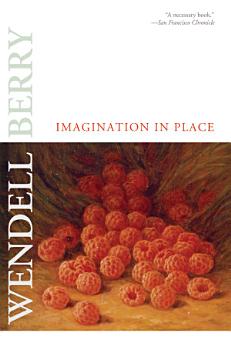Imagination in Place
មករា 2010 · Catapult
សៀវភៅអេឡិចត្រូនិច
208
ទំព័រ
family_home
មានសិទ្ធិ
info
reportការវាយតម្លៃ និងមតិវាយតម្លៃមិនត្រូវបានផ្ទៀងផ្ទាត់ទេ ស្វែងយល់បន្ថែម
អំពីសៀវភៅអេឡិចត្រូនិកនេះ
“Berry's latest collection of essays is the reminiscence of a literary life. It is a book that acknowledges a lifetime of intellectual influences, and in doing so, positions Berry more squarely as a cornerstone of American literature . . . A necessary book. Here, Berry's place as the 'grandfather of slow food' or the 'prophet of rural living' is not questioned. This book ensures we understand the depth and breadth of Berry's art.” —San Francisco Chronicle
“[A] stellar collection . . . Foodies, architects, transportation engineers, and other writers are adopting and adapting [Berry’s] concepts, perhaps leading to what he envisions will one day be 'an authentic settlement of our country.'“ —The Oregonian
A writer who can imagine the “community belonging to its place” is one who has applied his knowledge and citizenship to achieve the goal to which Wendell Berry has always aspired—to be a native to his own local culture. And for Berry, what is “local, fully imagined, becomes universal,” and the “local” is to know one's place and allow the imagination to inspire and instill “a practical respect for what is there besides ourselves."
In Imagination in Place, we travel to the local cultures of several writers important to Berry's life and work, from Wallace Stegner's great West and Ernest Gaines' Louisiana plantation life to Donald Hall's New England, and on to the Western frontier as seen through the Far East lens of Gary Snyder. Berry laments today's dispossessed and displaced, those writers and people with no home and no citizenship, but he argues that there is hope for the establishment of new local cultures in both the practical and literary sense.
Rich with Berry's personal experience of life as a Kentucky agrarian, the collection includes portraits of a few of America's most imaginative writers, including James Still, Hayden Carruth, Jane Kenyon, John Haines, and several others.
“[A] stellar collection . . . Foodies, architects, transportation engineers, and other writers are adopting and adapting [Berry’s] concepts, perhaps leading to what he envisions will one day be 'an authentic settlement of our country.'“ —The Oregonian
A writer who can imagine the “community belonging to its place” is one who has applied his knowledge and citizenship to achieve the goal to which Wendell Berry has always aspired—to be a native to his own local culture. And for Berry, what is “local, fully imagined, becomes universal,” and the “local” is to know one's place and allow the imagination to inspire and instill “a practical respect for what is there besides ourselves."
In Imagination in Place, we travel to the local cultures of several writers important to Berry's life and work, from Wallace Stegner's great West and Ernest Gaines' Louisiana plantation life to Donald Hall's New England, and on to the Western frontier as seen through the Far East lens of Gary Snyder. Berry laments today's dispossessed and displaced, those writers and people with no home and no citizenship, but he argues that there is hope for the establishment of new local cultures in both the practical and literary sense.
Rich with Berry's personal experience of life as a Kentucky agrarian, the collection includes portraits of a few of America's most imaginative writers, including James Still, Hayden Carruth, Jane Kenyon, John Haines, and several others.
អំពីអ្នកនិពន្ធ
Wendell Berry is the author of fifty books of poetry, fiction, and essays. He was recently awarded the Cleanth Brooks Medal for Lifetime Achievement by the Fellowship of Southern Writers and the Louis Bromfield Society Award. For over forty years he has lived and farmed with his wife, Tanya, in Kentucky.
វាយតម្លៃសៀវភៅអេឡិចត្រូនិកនេះ
ប្រាប់យើងអំពីការយល់ឃើញរបស់អ្នក។
អានព័ត៌មាន
ទូរសព្ទឆ្លាតវៃ និងថេប្លេត
ដំឡើងកម្មវិធី Google Play Books សម្រាប់ Android និង iPad/iPhone ។ វាធ្វើសមកាលកម្មដោយស្វ័យប្រវត្តិជាមួយគណនីរបស់អ្នក និងអនុញ្ញាតឱ្យអ្នកអានពេលមានអ៊ីនធឺណិត ឬគ្មានអ៊ីនធឺណិតនៅគ្រប់ទីកន្លែង។
កុំព្យូទ័រយួរដៃ និងកុំព្យូទ័រ
អ្នកអាចស្ដាប់សៀវភៅជាសំឡេងដែលបានទិញនៅក្នុង Google Play ដោយប្រើកម្មវិធីរុករកតាមអ៊ីនធឺណិតក្នុងកុំព្យូទ័ររបស់អ្នក។
eReaders និងឧបករណ៍ផ្សេងទៀត
ដើម្បីអាននៅលើឧបករណ៍ e-ink ដូចជាឧបករណ៍អានសៀវភៅអេឡិចត្រូនិក Kobo អ្នកនឹងត្រូវទាញយកឯកសារ ហើយផ្ទេរវាទៅឧបករណ៍របស់អ្នក។ សូមអនុវត្តតាមការណែនាំលម្អិតរបស់មជ្ឈមណ្ឌលជំនួយ ដើម្បីផ្ទេរឯកសារទៅឧបករណ៍អានសៀវភៅអេឡិចត្រូនិកដែលស្គាល់។








